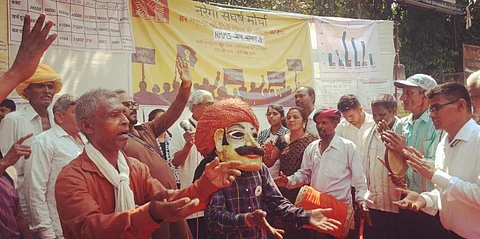

Mahatma Gandhi National Rural Employment Guarantee Act (MGNREGA) workers are now seeking legal aid in their fight against alleged violations by the Centre in enacting the scheme. Social activists have joined hands to approach legal experts and have prepared a document detailing the violations.
Protests voicing the woes of MGNREGA workers have been going on at Jantar Mantar, New Delhi for over 41 days. The demonstrations have been organised by national platform of workers’ collectives, NREGA Sangharsh Morcha, along with other activist groups and is expected to go on for 100 days.
Issues like mandatory digital attendance, wages to be paid to Aadhaar-linked bank accounts, delays in wages, fewer work days, low fund allocation and other issues have been brought up at the protest. Workers from Bihar, Uttar Pradesh, Jharkhand, West Bengal and Rajasthan have participated in it.
The central government has committed infractions at several levels, which is crushing the will of the rural population to work under the scheme, claim the activists.
A draft argument, “State versus the People: Attack on MGNREGA and Peoples’ Rights”, which details the violations, has been prepared and submitted to the lawyer fraternity. A copy of the document is with this Down To Earth reporter.
Activist bodies NREGA Sangharsh Morcha, People’s Action for Employment Guarantee (PAEG), Campaign for Judicial Accountability and Reforms (CJAR), Jan Sarokar, National Alliance of People’s Movements (NAPM), Right to Food Campaign (RTFC), Internet Freedom Foundation (IFF) and Rethink Aadhar and People First have come together to create the document.
“The idea is to apprise jurists of NREGA workers’ woes and chalk out ways in which legal fraternity can assist in supporting workers in their agitation,” said Nikhil Dey, activist. Dey addressed legal experts at an event at India International Centre, Delhi, on April 3, 2023.
“The government has claimed to reduce corruption, improve efficiency by introducing the National Mobile Monitoring System (NMMS) and Aadhar Based Payment System (ABPS). However, the lack of internet infrastructure in rural areas and difficult access to technology in uploading pictures and registering attendance is causing workers to lose out on working days,” he said.
Besides, ABPS is a cumbersome mapping system that demands workers link their Aadhaar card, bank account and National Payments Corporation of India (NPCI) mapper with the job card, he added.
These interventions were made mandatory in January and February 2023 but have no evidence of reducing corruption, the activist said.
“There is no method to cross-verify and authenticate the attendance system. Moreover, the worker has to provide attendance twice, which does not enable him to leave the site after work is done. The move has only added hurdles to access the workers their rightful and timely money,” he said.
There was a meeting with Secretary of Union Ministry of Rural Development Shailesh Kumar Singh on April 3, Dey said. However, its outcome only came to pushing the deadline for ABPS implementation.
At present, the deadline for implementation is April 30. “There should be bank account-based transfers as was practised earlier,” he demanded.
Delay in payment of wages is another issue plaguing the workers, said Rajshekhar, another activist.
Paragraph 29, Schedule II of the Act provides:
In case the payment of wages is not made within fifteen days from the date of closure of the muster roll, the wage seekers shall be entitled to receive payment of compensation for the delay, at the rate of 0.05 per cent of the unpaid wages per day of delay beyond the sixteenth day of closure of muster roll.
The MGNREGA clearly states that the onus is on the central government to ensure timely wages within 15 days and promises compensation for delayed payments, Rajshekhar said.
“A Supreme Court judgement from May 13, 2016 also said delayed payments of workers constitute a clear constitutional breach by the state or central government,” he added.
However, the document shared with law experts by the activists suggests the ministry continues to suppress the delays.
“Since the SC verdict, there is now a report on the management information system of the government, which captures the time taken in Stage 2, but the report does not actually show the quantum of delay, which is necessary to calculate delay compensation due,” it reads.
The document also highlights that since December 2021, the Centre has not paid any wages to the workers in West Bengal.
“About 10 per cent of the total workforce of MGNREGA belongs to West Bengal and the dues worth Rs 7,500 crores have not been released by the central government. This is a clear violation of the workers’ rights,” Dey said.
The central government claimed the funds were halted due to corruption and irregularities in the implementation of the scheme, said Rakshita Swamy, another member of NREGA Sangharsh Morcha.
“But for almost 1.5 years, no officials have been penalised or actions taken. The workers are being punished in the process,” she said.
Funds allocation of Rs 60,000 crore during the Budget 2023-24 by the Union Finance Ministry is the lowest in recent years and would only provide work for 15 days for the registered workers, the document read.
“The Act guarantees 100 days of work in a year and not allowing workers their right to employment is a clear violation of the law,” said Dey.
Public interest lawyer Prashant Bhushan said the violations make it a textbook case of approaching the court.
“However, approaching the bench has also become concerning and difficult as they are not always sympathetic and adjournment is easy. But workers should approach the judiciary to fight for their constitutional rights,” he said.